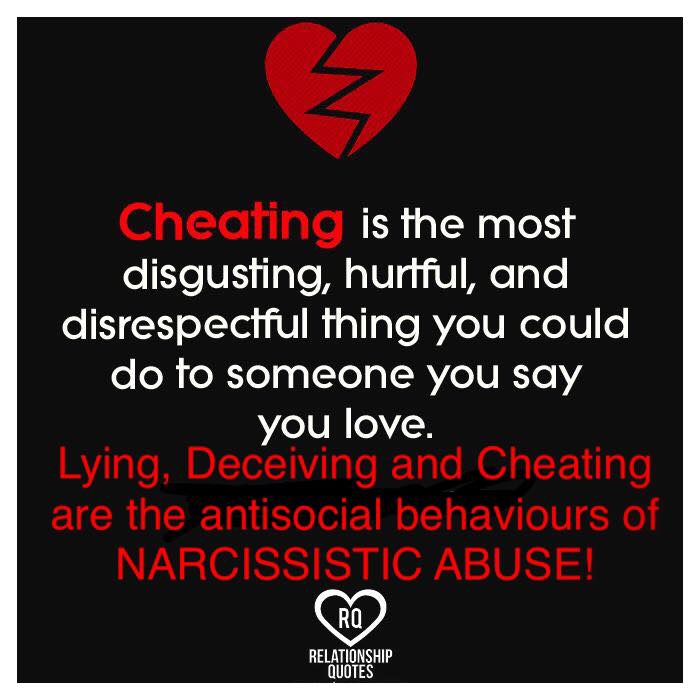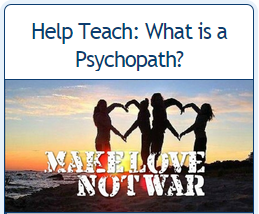Having no remorse means having no problem repeatedly attacking someone's soul.
|
The words "I love you" sound so good, you give a pass on neglectful behavior. Psychopaths take advantage of your forgiving nature, time and time again. Remorseless.
Having no remorse means having no problem repeatedly attacking someone's soul.
0 Comments
Psychopaths, aka sociopaths, are all around us. They are pathological liars, con artists, and false friends. They pretend to love and care - so they ensnare victims into phoney relationships. People are merely toys and tools, in their eyes, and easily discarded. They have a neurological lack of conscience that gives them an internal sense of superiority to the rest of us. There are three major failures in society that (secretly) enable sociopaths to engage in, and get away with, their atrocious behavior:
Approximately 39 million people in the United States may have exploitative personality disorders — antisocial, narcissistic or borderline. These are the people I refer to as “sociopaths.” Most of us don’t know they exist. In 2011, the scientific journal Innovations in Clinical Neuroscience published an article that examined previous studies of the prevalence of personality disorders in the United States and around the world. The authors examined five American and four international studies, dating back to 1989, and the studies consistently showed that about 10% of the general population has personality disorders. Cultural myths that blind us to danger All our lives, we hear cultural messages in church, school and the media, like the following: “We’re all created equal.” “We all just want to be loved.” “Everybody has good inside.” Unfortunately, these statements are not true for everybody. They are only true for the majority of the population who are capable of normal love and empathy. The statements are not true for the approximately 16% who have antisocial, narcissistic, or borderline personality disorders. No one tells us that there are exceptions to these feel-good maxims. No one tells us that human predators live among us, and that we need to protect ourselves from them. In fact, we hear messages that put us in even more danger, like: “Everyone deserves a second chance.” “Give him/her the benefit of the doubt.” “We all have issues/problems/flaws.” The bottom line: We don’t know that we likely are around personality-disordered people who want to take advantage of us. And when we do experience or witness bad behavior, we’re told to explain it away. Human beings are social animals, and our survival as a species was assured over the millennia because we developed the ability to trust each other. Trust is built into our DNA. When sociopaths target us for manipulation, the first step is taking advantage of our trust. They use love bombing, deception and the pity play to reel us in. The big picture of our cultural messages:
Excerpt from, "How the messages we hear all our lives keep us vulnerable to sociopaths", by Donna Andersen, Lovefraud.com, Jan 9, 2017.
Image courtesy Spiderpic.com Community Recruitment Announcement
Who we are recruiting The “Emotion, resilience, and post-traumatic growth in domestic abuse survivors” study investigates the outcome of being in an abusive romantic relationship. We are looking for participants (aged over 18) who identify as being in a prior heterosexual abusive romantic relationship. Abusive experiences may include verbal/ emotional abuse (i.e., bullying, manipulation), coercion (i.e., intimidation, threats, control of finances, isolation), lying and deceit (i.e., infidelities), and sexual assault. Particularly we are looking for people who identify as being abused by a romantic a partner who displays psychopathic or narcissistic characteristics. These may include:
What your participation will involve If you are interested in participating in the study please follow the link www.cuaftermath.com, which is a secure website where you will be asked to make an account with a username and password (no personal or identifying information will be asked, such as your name or address). The study will take approximately 1.5 hours to complete. The website is not compatible with mobile devices or Ipads, please use a computer or laptop device. On the secure website, you will be asked to complete a few questionnaires, a card game where you will select decks to gain as many points as possible, and a task where you will be presented a series of images of male faces and asked what emotion they are expressing. The questionnaires will include questions on your experiences of anxiety, depression, and post-traumatic stress, experiences of positive growth, and perceptions of interactions with other people (i.e., social support). There will also be questions addressing experiences in the abusive relationship (e.g., onset, type, severity, and length of abuse), and traits of the abuser, such as: Does he or she think it is fun to push people until they get upset? Has been convicted of a serious crime? Does he or she think they can get what they want by telling people what they want to hear? Please do not participate if…
Some of the questionnaires may address stressful topics. If you wish to withdraw at any time (even skipping a few questions on the questionnaires), you may do so as the study is entirely voluntary and anonymous. There will be no penalization if you decide to withdraw, no matter at what point in the study. You do not have to complete all of the study at one time; you can stop and complete the study at your convenience. There is the possibility that participation in the study may trigger or exacerbate distress. Incentive Participation in the current study is strictly voluntary (there will be no incentive or cash given for participation). This study has been approved by the Carleton University Research Ethics Board-A (CUREB-A) (103670).
Join us as we explore what to do if you meet a psychopath with Dr. Kent Kiehl. Dr. Kiehl is an author and neuroscientist who specializes in the use of clinical brain imaging techniques to understand major mental illnesses, with special focus on criminal psychopathy, psychotic disorders (i.e., schizophrenia, bipolar disorder, affective disorders), traumatic brain injury, substance abuse and paraphilias.
Also, he has designed the one-of-a-kind Mind Mobile MRI System to conduct research and treatment studies with forensic populations. To date his laboratory has deployed the Mind Mobile MRI System to collect brain imaging data from over 3000 offenders at eight different facilities in two states. This represents the world’s largest forensic neuroscience repository. Source: TherapyCable.com |
I Teach
how to detect a psychopath as easily as we see who is drug impaired. . Share with others: "What is a Psychopath/Sociopath?" Lesson Can You Spot A Psychopath?Teach your kids the signs with the app
"What is a psychopath?" Public Awareness Fund:
ABOUT ME:I was married to Harlan Taylor, who meets the psychopath criteria. Beware his illusion of nice guy. Now, I'm spreading awareness of neuroscience fMRI testing to identify psychopaths - those without a conscience. They are incapable of basic truth, and live by their own rules. Make money from your blog:
Great Adsense alternative that pays out at $10.
Archives
October 2021
Categories
All
CLICK Ads To Give for Awareness. Thank you!
Blogroll
NOPSYCHOS AbuseSanctuary After Narcissistic Abuse An Upturned Soul Light,Life,Love,Laughter Love Fraud OneMomsBattle Paula's Pontifications Psychopathy Awareness Psychopaths and Love GeneticPsycho.Wordpress.com Links
PSYCHOPATHY RESEARCH: Identifying a psychopath by MRI Is Psychopathy Genetic? at Aftermath: Surviving Psychopathy Foundation What is a Psychopath? (Sociopath?) Like Regular folks, not deranged raving maniacs Dealing with Manipulative People * 30 RED FLAGS * at PsychopathFree.com For Young Girls (&Boys): Red Flags Handbook "Why You Attract Narcissists" video Audiobooks (educational) |






 RSS Feed
RSS Feed
